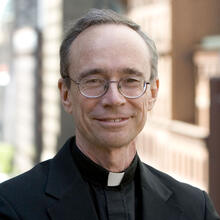(RNS) — Many people believe that excommunication is the Catholic Church’s equivalent of capital punishment — the worst punishment that the church can impose on a believer. Some even see it as the earthly equivalent of being cast into hell.
People call for priests who abuse children to be excommunicated because they want the priests to receive the most severe punishment available. When a serial abuser such as former Jesuit priest Marko Rupnik is excommunicated for a related offense, they are shocked to hear that his excommunication was lifted a week after it was imposed.
What is going on here?
First, not all crimes demand excommunication. If you are found guilty of one that does, in some circumstances you are not excommunicated unless you knew what you’d done is an excommunicable offense and you persisted in the offense.
Actions that can lead to excommunication include violation (desecration) of the sacred species (Eucharist), a physical attack on the pope, absolution of an accomplice in a sexual sin, an unauthorized episcopal consecration and violation of the seal of confession. These five excommunications can only be lifted by the Holy See.
Other excommunications, even those resulting from abortion, apostasy, heresy and schism, can be lifted in confession by a bishop or priest, depending on the case. In 2016, Pope Francis gave priests authority to absolve the sin of abortion.
More surprising to many is the fact that excommunicated persons are still members of the church (unless they formally leave the church themselves). Excommunicated persons may attend Mass, but not receive the Eucharist. Nor can an excommunicated person participate in church governance or receive income from a church office. An excommunicated priest is forbidden from celebrating the sacraments, though if he does, the sacraments are valid but not licit — they have the presumed effect, but aren’t considered lawful.
Excommunication, rather than being the equivalent of an execution, is more like being denied entry into a friend’s home because you did something to upset them. You need to apologize before you are going to be welcomed back. Your friend does not want to permanently break from you, but unless you apologize, your relationship has no future.
This is what the church means when it refers to excommunication as a “medicinal” penalty. It is focused on getting the offender to reform and be reintegrated into the community. Such a censure, according to the “New Commentary on the Code of Canon Law” of the Canon Law Society of America, “must be remitted when the offender ceases being contumacious and is willing to be reintegrated within the community.”
In other words, to have an excommunication lifted, all the offender must do is say, “I am sorry,” go to confession, and the excommunication will be lifted by the appropriate authority.
The church could subject abusive clergy to excommunication, and perhaps it should, but it would have limited impact because it can be lifted so easily.
Rupnik was excommunicated not for abusing women, but for “absolving his accomplice” — the person with whom he had sex. It does not matter whether the sex was consensual. Such perversion of the sacrament of confession is a matter for excommunication because it puts penitents at risk.
A week later, after he said he was sorry, Rupnik’s excommunication had to be lifted.
There are other ways to punish a priest. The Jesuits restricted his ministry after his excommunication and eventually expelled him from the order when he refused to observe these restrictions. It is much simpler and quicker to throw a person out of a religious community for disobedience than for other crimes, because the evidence is easily documented.
Thus, for Rupnik, being expelled from the Jesuits was a more severe punishment than excommunication, because his expulsion is permanent.
Laicization is also more severe than excommunication because it permanently forbids a priest from the exercise of ministry. It also frees the church from financial responsibility for the priest unless civil law requires it.
Originally, the Dicastery for the Doctrine of the Faith refused to prosecute Rupnik for abuse because his offense was beyond the statute of limitations. Francis, however, eventually waived the statute of limitations so that Rupnik could be prosecuted, something that would be illegal under the U.S. Constitution for criminal cases.
The American legal system is built on the belief that it is better to let 10 guilty people go free than to convict one innocent person. It requires proof of guilt “beyond a reasonable doubt.”
The church does not have such high standard of proof. It only requires “moral certitude,” whereby “judges must be able to exclude the probability of error but are not held to the impossible and paralyzing standard of excluding all possibility of error,” according to the CLSA commentary.
But much of canon law, like American criminal procedure, is there to protect people from arbitrary power. The church legal system is clunky. Justice is not swift, especially when the office dealing with abuse cases is understaffed.
Cardinal Joseph Ratzinger, when he headed the Dicastery for the Doctrine of the Faith, short-circuited some canonical protections to deal with a tsunami of abuse cases. Many priests were laicized without a trial in a process to which some canonists objected.
The church has not had a good system for punishing people since we got rid of the Inquisition. As a result, it must cooperate with civil authorities, who have the power to truly punish crimes. Sadly, because of the statute of limitations, the American criminal justice system often makes this impossible.








